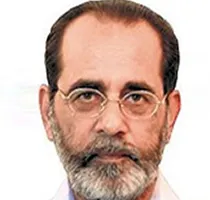-
CENTRES
Progammes & Centres
Location
If Macron loses control of the National Assembly in June, he may be forced into an uneasy co-habitation that will limit his policy options. He knows that.

According to Macron, Europe had relied too blindly on the US for its defence and needed to take charge of its destiny, of the European project. There were growing differences between ‘new Europe’ and ‘old Europe’ that created factions within NATO, after its doubling from 14 countries in 1991 to 28 today. The 2008 financial crisis and the Eurozone crisis highlighted the difficulty of having a common currency among 19 different countries at varying levels of development and governance structures. This had created disenchantment with globalisation. Right-wing parties were gaining ground in Germany, Austria, the Netherlands, and even in the Nordic states. In France too, the Right-wing Front National of Jean Marie Le Pen had been rebranded by his daughter Marine Le Pen as National Rally and its image makeover was attracting the disenchanted. The fragmentation of the Left had begun in the 1990s and now it was happening on the Right. Macron successfully exploited this in 2017 to capture the middle ground, appearing as a pragmatic centrist, committed to the EU and the Euro, pro-globalisation and business friendly but progressive on social issues. He brought a message of confidence, reviving optimism about France, based on technology, education and innovation. It was a meteoric rise and he won a resounding victory with a 66 per cent vote.Macron successfully exploited this in 2017 to capture the middle ground, appearing as a pragmatic centrist, committed to the EU and the Euro, pro-globalisation and business friendly but progressive on social issues.
French elections follow a two-stage process. Unless the first round throws up a winning candidate obtaining over 50 per cent of the vote, a run-off takes place between the top two candidates. In the first round held on 10 April this year, Macron took the lead with 27.8 per cent, but with Le Pen and Melenchon following with 23.1 per cent and 21.9 per cent respectively. For the first time, the candidates on the far Right and far Left accounted for 58 per cent of the vote. Traditional mainstream party candidates were routed. The centre-Right candidate Valerie Pecresse, who had been part of President Chirac’s team and was later Higher Education Minister in President Sarkozy’s cabinet, got 4.8 per cent while centre-Left Socialist candidate Anne Hidalgo, mayor of Paris since 2014, was reduced to 1.7 per cent. It was a wake-up call for Macron who had not spent time on the campaign trail, engaging more in high-profile diplomacy on the Ukraine war, relying on appearing presidential. The strategy had backfired and Le Pen exploited it successfully as rising cost of living became the most important issue for nearly two-thirds of the electorate, by appearing as a more normal and approachable candidate. In the final stages, the run-off round became a referendum, a question of who the voters disliked more. An abstention of 28 per cent, the highest since 1969, reflects the disenchantment of the people with the choices on offer. The message has registered with Macron who instead of striking a jubilant note adopted a conciliatory tone in his victory speech, ‘promising to be a president for all’ and thanking those who helped defeat Le Pen. The latter was an acknowledgement of the Left vote; 41 per cent of the Melenchon’s voters held their noses but voted for Macron just to prevent a Le Pen victory. Macron’s challenges in his second term are greater. In 2017, his party won 314 seats in the 577 strong National Assembly, but this time both Melenchon and Le Pen are calling the Assembly elections scheduled for mid-June as a ‘third round’. If Macron loses control of the Assembly, he may be forced into an uneasy co-habitation that will limit his policy options. It is the fate that befell both his predecessors, Mitterand and Chirac, in their second terms. Macron is aware that French voters can be fickle; a quick and convincing image make-over is necessary if Macron has to create history, by becoming the first president to win a second term and keep control of the Assembly.The strategy had backfired and Le Pen exploited it successfully as rising cost of living became the most important issue for nearly two-thirds of the electorate, by appearing as a more normal and approachable candidate.
The views expressed above belong to the author(s). ORF research and analyses now available on Telegram! Click here to access our curated content — blogs, longforms and interviews.

Ambassador Rakesh Sood was a Distinguished Fellow at ORF. He has over 38 years of experience in the field of foreign affairs economic diplomacy and ...
Read More +